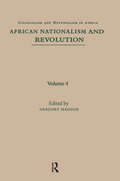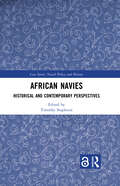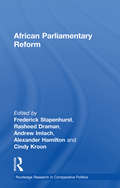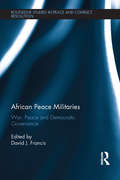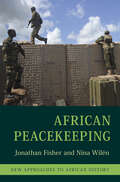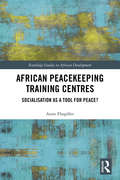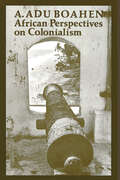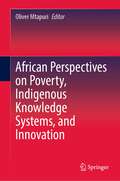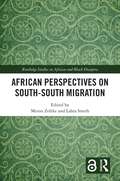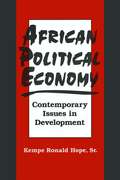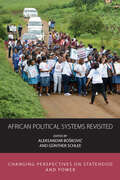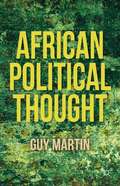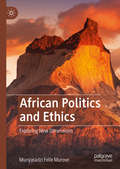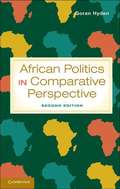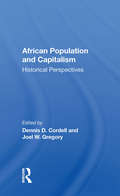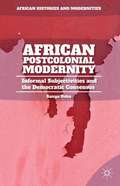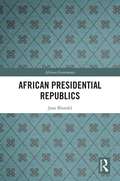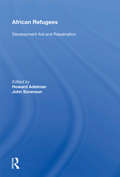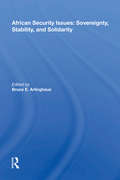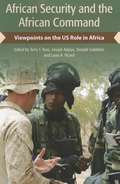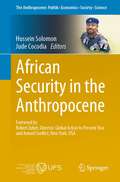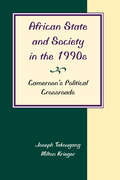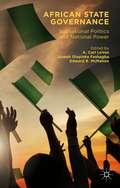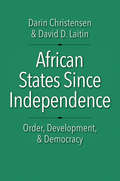- Table View
- List View
African Nationalism and Revolution (Colonialism And Nationalism In Africa Ser. #Vol. 4)
by Gregory MaddoxThe study o f African history as an academic discipline is a rather new field and one that still has its detractors both w ithin and outside academics. This collection o f articles highlights for students and scholars the modern era in African history. It brings together published research on the colonial era in Africa, an era relatively brief but one that sawdramatic change in African societies.
African Navies: Historical and Contemporary Perspectives (Cass Series: Naval Policy and History)
by Timothy StapletonThis edited volume focuses on aspects of the understudied theme of African sea-power, including African navies and the engagement of non-African navies with the continent. Africa possesses 48,000 kilometers of coastline, comprising 38 out of 54 of the continent’s states and several strategic choke points for international shipping, such as the Suez Canal, the Gulf of Aden and the Cape of Good Hope. Nevertheless, post-colonial Africa’s small navies and their relations with the navies of external powers have not received much scholarly attention. Focusing on Sub-Saharan Africa, this collection attempts to address this neglect and stimulate further research by offering original chapters related to historical and contemporary themes around Africa’s navies. The historical chapters cover the origin of the Tanzanian, Ethiopian, Nigerian and Ghana navies during the era of decolonization and the Cold War, the asymmetrical naval campaign fought during the Nigerian Civil War (1967-70), and the activities of the Soviet Navy in supporting African states and movements fighting lingering colonialism and white supremacy during the 1970s and 1980s. Focusing on the contemporary situation, other chapters discuss the engagement of the Indian Navy with Africa, the potential role of the Angolan and Mozambican navies in the Southern African Development Community (SADC), the transformation and development of the post-apartheid South African Navy, and the challenges and capabilities of African navies in the early twenty-first century. The book concludes by discussing the question of whether African coastal countries need navies. This book will be of much interest to students of naval power, strategic studies, African politics and International Relations.
African Parliamentary Reform (Routledge Research in Comparative Politics)
by Alexander Hamilton Rick Stapenhurst Rasheed Draman Andrew Imlach Cindy KroonSome of the most far-reaching and innovative parliamentary reform is occurring in Africa. While these reforms are not yet widespread across the continent, parliaments in some African countries are asserting their independence as policymakers, as overseers of government and as the guardian of citizens’ rights and needs. This book presents recent reforms in selected African parliaments – Ghana, Kenya, Uganda, Tanzania, Rwanda, Benin, Zambia, Ethiopia, Liberia and Nigeria. It also presents cross-cutting innovations by African parliaments – in fighting corruption, in providing development to constituents and in combatting climate change. Many of the chapters are authored by African MPs themselves, making this a book ‘by MPs for MPs’, as well as being of interest to students and scholars of African Politics, and to those international institutions that support parliamentary development. African Parliamentary Reform is a joint initiative by the World Bank Institute, the Commonwealth Parliamentary Association and the Parliamentary Centre (Africa).
African Peace Militaries: War, Peace and Democratic Governance (Routledge Studies in Peace and Conflict Resolution)
by Edited by David J. FrancisThis book provides a critical understanding of the emerging role of African militaries in peacetime democratic Africa. This book departs from the dominant perspective which simply presents the military as an ‘enemy’ of democracy because of the history and legacy of unending military coup d’états and interventions in civilian politics. In the context of Africa, the military has been blamed or largely held responsible for instigating wars, armed conflicts, political violence, poverty and underdevelopment due to bad governance and mismanagement of the state. Drawing from diverse case studies across Africa, including Nigeria, Rwanda, Uganda, Ethiopia and Egypt, this volume presents the argument that though the military has played a negative, and sometimes, destructive role in undermining constitutional rule and the overthrow of democratic civilian governments, the same military, now operating in a changed global environment, is making effort to support the development of democracy and democratic consolidation as well as remain subjected to civilian democratic oversight and control. Notwithstanding, the real challenge for this emerging trend of African peace militaries is the extent to which they are able to fulfil, on a predictable and consistent basis, their constitutional mandate to defend the people against ‘elected autocrats’ in Africa who try to use the military to perpetuate themselves in power. This work fills a critical gap in the literature and will be of much interest to students of African security and politics, peace and conflict studies, security studies and IR in general.
African Peacekeeping (New Approaches to African History #17)
by Nina Wilén Jonathan FisherExploring the story of Africa's contemporary history and politics through the lens of peacekeeping, this concise and accessible book, based on over a decade of research across ten countries, focuses not on peacekeeping in Africa but, rather, peacekeeping by Africans. Going beyond the question of why post-conflict states contribute troops to peacekeeping efforts, Jonathan Fisher and Nina Wilén demonstrate how peacekeeping is – and has been – weaved into Africa's national, regional and international politics more broadly, as well as what implications this has for how we should understand the continent, its history and its politics. In doing so, and drawing on fieldwork undertaken in every region of the continent, Fisher and Wilén explain how profoundly this involvement in peacekeeping has shaped contemporary Africa.
African Peacekeeping Training Centres: Socialisation as a Tool for Peace? (Routledge Studies in African Development)
by Anne FlaspölerPeacekeeping training centres play a crucial role in preparing peacekeepers for their deployment. However, despite their popularity within the international community as a tool for achieving international security, development, and state-building objectives, they have not received a great deal of analysis or academic attention. This book provides an in-depth analysis of peacekeeping training in Africa, tracing how centres have adapted to the operational and normative changes of peace operations over time and raising questions about the expectations attached to these training efforts and their impact. The book examines training content and methods in detail, exploring the potential of peacekeeping training centres as sites for socialisation and diffusing international norms in an effort to change and shape peacekeepers' behaviour. The analysis is based on two contrasting case studies, selected to show the spectrum of training centres operating in Africa, namely the Kofi Annan International Peacekeeping Training Centre (KAIPTC) in Accra, Ghana, and the African Centre for the Constructive Resolution of Disputes (ACCORD) in Durban, South Africa. At a time when impact is being determined by the number of course attendees, this book provides an important critical assessment of training efforts and what they are supposed to achieve. It will be of interest to scholars and practitioners within the fields of international security, peacekeeping, and African development.
African Perspectives on Colonialism (The Johns Hopkins Symposia in Comparative History #15)
by A. Adu BoahenThis history deals with the twenty-year period between 1880 and 1900, when virtually all of Africa was seized and occupied by the Imperial Powers of Europe. Eurocentric points of view have dominated the study of this era, but in this book, one of Africa's leading historians reinterprets the colonial experiences from the perspective of the colonized. The Johns Hopkins Symposia in Comparative History are occasional volumes sponsored by the Department of History at the Johns Hopkins University and the Johns Hopkins University Press comprising original essays by leading scholars in the United States and other countries. Each volume considers, from a comparative perspective, an important topic of current historical interest. The present volume is the fifteenth. Its preparation has been assisted by the James S. Schouler Lecture Fund.
African Perspectives on Poverty, Indigenous Knowledge Systems, and Innovation
by Oliver MtapuriThis book examines the connections between poverty and innovation in Africa. Through case studies and theorizations from a distinctly African perspective, it stands in contrast to current theoretical works in the field, which remain very much rooted in Western-orientated thinking. The book investigates the application of methodologies which explain numerous African contexts in connection with issues of poverty and inequality. It reflects on comparative practices and praxes on the African continent, including commonplace traditions and practices in alleviating poverty, taken against a background of the failure of current prescriptions for poverty alleviation, such as the Structural Adjustment Programmes (SAPs) and the Poverty Reduction Strategy Papers (PRSP). There is a dire need for new practical perspectives which move Africa forward using its indigenous knowledge. Owing to a general lack of recorded African theories and methodologies on poverty, inequality and innovation, this book represents a pioneering corpus of African knowledge addressing poverty and inequality through local innovations. Adopting a transdisciplinary approach, it is relevant to students and scholars in development studies and economics, African studies, social studies, political history and political economy, climate studies, anthropology and geography.
African Perspectives on South–South Migration (Routledge Studies on African and Black Diaspora)
by Lahra SmithThis book investigates the diverse and dynamic forms of migration within Africa. It will be crucial reading for researchers, students, and policy makers with a focus on South-South Migration, Migration and Inequalities, Migration and Development, and Refugee and Humanitarian Studies.
African Political Economy: Contemporary Issues in Development
by Kempe Ronald Sr.This is a multidisciplinary book that analyses the problems and issues of development in Africa along with the attempts at, and outcomes of, policy reform measures that have been implemented to surmount those problems. Topics covered include the economic crisis in Africa, urbanisation and urban management, uneven development, the socio-economic context of AIDS, bureaucratic corruption and reform, and proposed development solutions.
African Political Systems Revisited: Changing Perspectives on Statehood and Power (Integration and Conflict Studies #26)
by Aleksandar Bošković Günther SchleeReexamining a classical work of social anthropology, African Political Systems (1940), edited by Fortes and Evans-Pritchard, this book looks at the colonial and academic context from which the work arose, as well as its reception and its subject matter, and looks at how the work can help with analysis of current politics in Africa. This book critically reflects upon the history of anthropology. It also contributes to a political anthropology which is aware of its antecedents, self-reflexive as a discipline, conscious of pitfalls and biases, and able to locate itself in its academic, social and political environment.
African Political Thought
by Guy MartinFocusing on individual political thinkers and beginning with indigenous African political thought, the book successively examines African nationalism, African socialism, populism and Marxism, Africanism and pan-Africanism, concluding with contemporary perspectives on democracy, development and the African state.
African Politics and Ethics: Exploring New Dimensions
by Munyaradzi Felix MuroveIn this book, Munyaradzi Felix Murove explores African traditional ethical resources for African politics. Arguing that African ethics is integral to African post-colonial political contentious discourse, Murove invites the reader to reflect on various problematic political issues in post-colonial Africa and how African ethics has been applied in these situations. Starting with a succinct discussion of the scope of African ethics, he discusses how African ethical values have been applied by post-colonial politicians in the reconstruction of their societies. Further, Murove looks critically at the issue of African poverty and how the ethic of regional integration and economic cooperation among post-colonial African nation-states has been instrumental to efforts aimed at overcoming the scourge of poverty. The main question this book seeks to answer is: Are African traditional ethical values a panacea to modern African political problems?
African Politics in Comparative Perspective
by Goran HydenThis revised and expanded second edition of African Politics in Comparative Perspective reviews fifty years of research on politics in Africa and addresses some issues in a new light, keeping in mind the changes in Africa since the first edition was written in 2004. The book synthesizes insights from different scholarly approaches and offers an original interpretation of the knowledge accumulated in the field. Goran Hyden discusses how research on African politics relates to the study of politics in other regions and mainstream theories in comparative politics. He focuses on such key issues as why politics trumps economics, rule is personal, state is weak and policies are made with a communal rather than an individual lens. The book also discusses why in the light of these conditions agriculture is problematic, gender contested, ethnicity manipulated and relations with Western powers a matter of defiance.
African Population And Capitalism: Historical Perspectives
by Dennis D. CordellThis is a synthesis of case studies and theory which takes issue with established African demographic theory, emphasising that demography is an historical process, a permanent and varied adaptation to social and economic change. The book covers 20 African societies in the sub-Saharan region, examining not the effects of slavery, colonialism and capitalism on each, but also the resistance and resilience of indigenous African institutions and individuals.
African Postcolonial Modernity: Informal Subjectivities And The Democratic Consensus (African Histories and Modernities)
by Sanya OshaAfrican cultures and politics remain significantly affected by precolonial and postcolonial configurations of modernity, as well as hegemonic global systems. This project explores Africa's conversation with itself and the rest of the world, critiquing universalist notions of democratization.
African Presidential Republics (African Governance)
by Jean BlondelThis book provides a systematic assessment of the behaviour of some relatively successful presidents in African presidential republics, examining the part played by presidents in the development of their countries. Using two groups of case studies, African Presidential Republics examines the variations between presidential republics within Africa since decolonisation. Jean Blondel divides the ten countries studied into those in which presidents had always been elected regularly, namely Botswana, Mozambique, Namibia, Senegal and Tanzania, and those in which there was irregularity in the appointment of presidents, namely Benin, Uganda, Ghana, Liberia and Nigeria. The case studies analyse the manner in which presidential republics have manifested themselves in Africa, exploring the argument that the presidential republic is one of the key institutional arrangements likely to lead societies towards development. African Presidential Republics will be of interest to students and scholars of African politics, comparative politics and political leadership.
African Refugees: Development Aid And Repatriation
by Howard Adelman; John SorensonOf the world's refugees, more than a third live in Africa, displaced from their homelands by war, poverty, famine and political persecution. In this book, contributors explore key issues related to these refugee populations. The first section looks at the legal framework for defining and assisting refugees, and the second deals with the issue of relief by considering specific cases, the general problems faced and particular relief efforts. Subsequent chapters examine forced migration, resettlement and repatriation, conflict with local populations, integration of refugees, and sustainable development.
African Security Issues: Sovereignty, Stability, And Solidarity
by Bruce E. ArlinghausAs African nations emerge more fully from the immediate postinde-pendence era, there is a pressing need to examine their security concerns from both African and global perspectives. Issues of strategic access and resources, superpower and regional conflict, economic growth and internal stability, and the role of African nations as a significant blo
African Security and the African Command: Viewpoints on the US Role in Africa
by Terry F. Buss Joseph Adjaye Donald Goldstein Louis A. Picard<p>After the end of the Cold War and a failed mission in Somalia, the US decided to wash its hands of major military operations in Africa. Within the past few years, however, strategic interests in the region have grown, based largely on the threat of international terrorist group activities there. In 2007, the Bush Administration created a new military presence in Africa, AFRICOM (United States Africa Command), professed to be based not on occupying military or fixed bases, but rather on capacity building for and collaboration with African security forces. <p>Some see AFRICOM as the answer to an African security system crippled by a lack of resources, widespread politicization and institutional weakness. Others claim the program is nothing more than a characteristic attempt by the US to secure its own interests in the region without regard to the actual needs of Africans. A variety of viewpoints on the debate, both from the US and Africa, come together in this collection to examine the objectives and activities of AFRICOM. The result provides the reader with a well-rounded picture of longstanding security challenges in Africa and what might be done to address them.</p>
African Security in the Anthropocene (The Anthropocene: Politik—Economics—Society—Science #36)
by Hussein Solomon Jude CocodiaMuch has been written on security in Africa—its democratic deficit, poor civil-military relations, and myriad conflicts—but these are often treated in isolation from one another. This book takes a different approach, as it links all of these issues to the dynamics of the Anthropocene. Penned by African scholars on the continent and in the diaspora, it examines the different challenges not as separate entities but as outcomes of the Anthropocene Age. In this geological epoch, humans have become a global force—unfortunately, not necessarily for good. The interaction between humans and the climate, the effects of waste, the impact of pollution on marine and terrestrial ecosystems, the loss of biodiversity, and the change in the chemical composition of the soil, oceans and atmosphere are key identifiers of the age of the Anthropocene. This has fueled conflict and instability from the vast swathes of the Sahel to Somalia. Responding to these issues of insecurity without understanding their inter-connectedness and how this relates to the environment can only result in failure. From this perspective, the current structures in place are inadequate for the task of confronting insecurity at the state and continental levels, as represented by the African Union. What is needed is a radical reevaluation of Africa’s security architecture and approach to security. This necessitates pooling sovereignty on a continental and global level. It necessitates less state-centric responses that include civil society and the business community as equal partners of states in order to collectively confront insecurity in the age of the Anthropocene.• The authors are academics, policy makers and military veterans who have worked in building capacity on the African continent• The book is comprehensive in scope, strong on theory, pragmatic in policy and reflects experience from the field.• The authors approach makes the book easy, interesting and intriguing.
African Socialism in Postcolonial Tanzania
by Priya LalDrawing on a wide range of oral and written sources, this book tells the story of Tanzania's socialist experiment: the ujamaa villagization initiative of 1967–1975. Inaugurated shortly after independence, ujamaa ('familyhood' in Swahili) both invoked established socialist themes and departed from the existing global repertoire of development policy, seeking to reorganize the Tanzanian countryside into communal villages to achieve national development. Priya Lal investigates how Tanzanian leaders and rural people creatively envisioned ujamaa and documents how villagization unfolded on the ground, without affixing the project to a trajectory of inevitable failure. By forging an empirically rich and conceptually nuanced account of ujamaa, African Socialism in Postcolonial Tanzania restores a sense of possibility and process to the early years of African independence, refines prevailing theories of nation building and development, and expands our understanding of the 1960s and 70s world.
African State And Society In The 1990s: Cameroon's Political Crossroads
by Joseph TakougangAfrican State and Society in the 1990s is the first comprehensive English language book to appear on Cameroon's political events since 1989. Designed for academic and policy studies readers, it covers developments from the 1960s to the present as background for an analysis of the continuing conflict since 1990 between the regime and political oppos
African State Governance: Subnational Politics And National Power
by A. Carl LeVan Joseph Olayinka Fashagba Edward R. McMahonAfrica is changing and it is easy to overlook how decentralization, democratization, and new forms of illiberalism have transformed federalism, political parties, and local politics. Chapters on Kenya, Nigeria, Ethiopia, and South Africa help fill an important gap in comparative institutional research about state and local politics in Africa.
African States since Independence: Order, Development, and Democracy (Castle Lecture Series)
by Darin Christensen David D. LaitinAuthors Christensen and Laitin argue that an interplay of geographic, historical, and demographic factors undergird sub‑Saharan states’ post‑independence struggles to eradicate poverty, establish democratic accountability, and quell civil unrest. They set out the founding fathers’ challenges in transforming their postcolonial states, many of which are ethnically diverse, geographically diffuse, sparsely populated, and lacking in administrative capacity. With the legacies of the slave trade, partition, Christian missionaries, and extractive colonial institutions complicating their efforts, many African states faced stagnation, authoritarianism, and civil strife. Recent years have seen promising attempts to restore democracy to states under authoritarian rule and to liberalize their economies, suggesting that the region is moving toward a new era. Relying on the best statistical data and richly illustrated with case material, this book is an indispensable source for scholars and policy analysts seeking to understand Africa’s post‑independence political trajectories.
